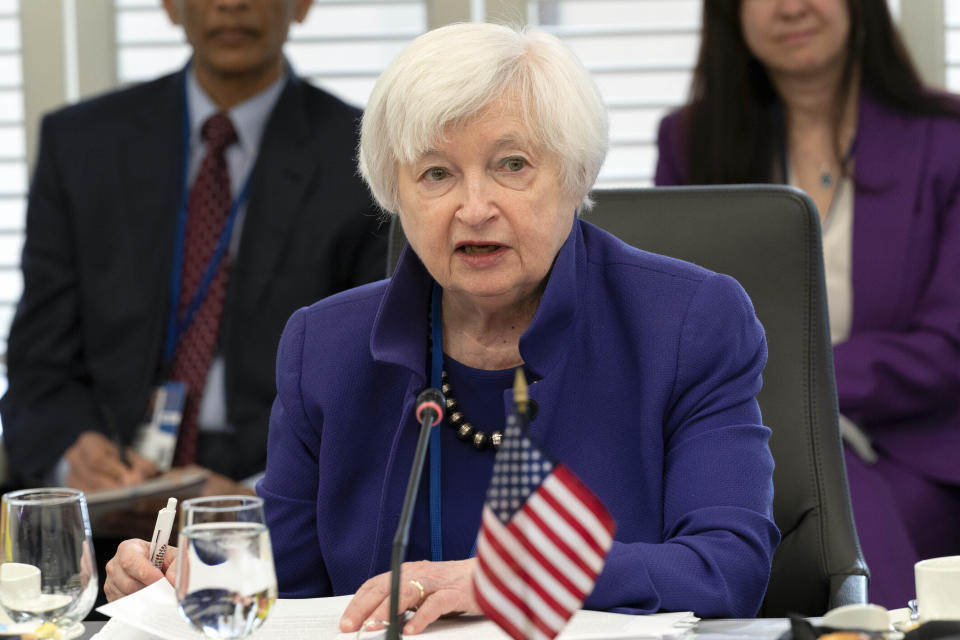Treasury Secretary Janet Yellen gave a major address on Thursday that laid out the Biden administration’s key objectives for what she called an “essential” economic relationship between the world’s largest economies.
Yellen said the US seeks “constructive and fair” economic ties with China and was not pushing to ‘decouple’ from the Chinese economy – a move that she felt would be “disastrous” for the world.
But she warned that the US would protect its national security interests, its values on human rights and push back against Chinese actions to dominate foreign competitors.
Speaking at Johns Hopkins University’s School of Advanced International Studies, Yellen said “a growing China that plays by international rules is good for the United States and the world.”
However, she said the US was “considering a programme to restrict certain US outbound investments in specific sensitive technologies with significant national security implications”.
These moves were driven by “straightforward security considerations” and not designed for a competitive economic advantage, she said. They would be narrowly scoped and calibrated to mitigate spillovers.
ALSO SEE:
China Becoming More Rival Than Partner: Germany’s Baerbock
Ending war in Ukraine
Ending Russia’s “illegal and unprovoked” war against Ukraine, Yellen said, would be “the single best thing we can do for the global economy.”
But China’s “no limits” partnership with Moscow was a worrying indication that Beijing was not serious about ending the war, and she said that any effort to provide Russia with material support in its war with Ukraine could spur serious consequences.
“It is essential that China and other countries do not provide Russia with material support or assistance with sanctions evasion,” she said, adding that the consequences of any violations would be “severe.”
She also voiced concern about escalating repression in China, saying that “human rights abuses violate the world’s moral conscience. They also violate the foundational principles of the United Nations – which virtually every country, including China, has signed onto.”
No desire to ‘decouple’
Yellen contrasted strong US growth with China’s slowing GDP output, arguing that the US would remain the world’s unparalleled economic leader in metrics from wealth to technological innovation.
But she said a growing China was in the interest of both countries, as long as it followed global rules.
“We do not seek to ‘decouple’ our economy from China’s. A full separation of our economies would be disastrous for both countries. It would be destabilizing for the rest of the world.
“Rather, we know that the health of the Chinese and US economies is closely linked. A growing China that plays by the rules can be beneficial for the United States. For instance, it can mean rising demand for US products and services and more dynamic US industries.”
Yellen’s remarks come amid heightened tensions and pessimism in the US-China relationship over national security issues, including Taiwan, Russia’s war in Ukraine, growing US export bans on advanced technologies and China’s state-led industrial policies.
She acknowledged that her speech came at a “critical time” when China has taken a more confrontational posture toward the US and its allies.
“Our relationship is clearly at a tense moment,” Yellen said. “My goal is to be clear and honest, to cut through the noise and speak to this essential relationship, based on sober realities.
“Both countries need to be able to frankly discuss difficult issues. And we should work together, when possible, for the benefit of our countries and the world.”
Call for ‘healthy competition’
Yellen said the administration sought to foster cooperation, where possible, on global issues such as climate change, debt relief and macroeconomic stability, although she considered that China had been a “roadblock” on debt restructurings for poor countries.
Washington would clearly communicate its concerns about China’s increased support for state-owned enterprises and domestic firms to dominate foreign competitors, as well as “aggressive” efforts to acquire American technology, including through intellectual property theft, Yellen said.
At the same time, she said the Biden administration was not seeking a “winner-take-all” competition, and believed that healthy economic competition with a fair set of rules could benefit both countries over time.
“Sports teams perform at a higher level when they consistently face top rivals. Firms produce better and cheaper goods when they compete for consumers,” she said.
Plan to visit Beijing
Yellen said she intended to travel to Beijing “at the appropriate time” to meet with her new Chinese counterparts to help “responsibly” manage the relationship, but Treasury offered no details on the timing of a trip.
International Monetary Fund managing director Kristalina Georgieva warned last week that such tensions and supply chain “friend-shoring” could spill into a new Cold War that would stunt global growth.
Yellen’s remarks were the most comprehensive articulation of the Biden administration’s China strategy to date, marking a shift from a sense of “fatalism” and “great power competition” that has permeated the relationship, said Scott Kennedy, a China expert at the Center for Strategic and International Studies in Washington.
“This is no call to return to the previous policies of unconditional engagement,” Kennedy said. “It was quite tough and unapologetic about US efforts to defend national security and human rights.”
- Jim Pollard with Reuters
ALSO SEE:
China Calls on WTO to Review Chip Export Curbs Led by US
US ‘Discussing Possible China Sanctions’ With Allies Over Ukraine
US Warns China Will Face ‘Real Costs’ for Lethal Aid to Russia
Chinese Firm in Talks to Sell Military Drones to Russia: Report
























